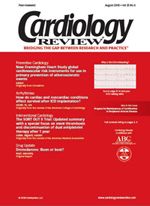Publication
Article
Cardiology Review® Online
Diagnosis through imaging and stent-related death
Author(s):
Cardiology Review
indefinite
This month, features pictures—not from any summer vacations, but from our bimonthly imaging feature. Dr Aditya S. Prasadand colleagues present a fascinating case in which bradycardia and conduction disturbances are uncovered in a patient when he is admitted to the emergency department following a drinking binge. The coronary artery disease (CAD) section considers a topic that has captured considerable attention in the world media: the surprising data indicating that drug-eluting stents—while exhibiting a lower rate of restenosis than bare metal stents—have a higher subsequent rate of death and myocardial infarction. This paradox is explored at length by Dr Michael Handkeand associates from Switzerland in their study of 826 consecutive patients who participated in a randomized trial at the University Hospital in Basel. As the authors conclude, the routine stopping of clopidgrel between 7 and 18 months after stent placement may have to be reconsidered in light of their recent results, and indeed use is now the current guideline, as Dr Richard Stewartpoints out in his commentary. Unfortunately these results indicate—as the authors state—"that the patient may have to pay a price for the lower rate of restenosis… namely increased late-stent thrombosis." In another feature, French authors Dr Antoine DaCostaand associates evaluate the role of radiofrequency catheter ablation (RFA) versus drug therapy in the treatment of a first episode of symptomatic atrial flutter. This multicenter, prospective study randomized 104 patients into RFA-treated groups and an amiodarone-treated group. Results indicated that because RFA had a better long-term success rate and fewer secondary side effects, it should be considered as appropriate first-line therapy for selected patients; our consultant board member Dr Stephen Vlaycomments on these findings. In a combined CAD and imaging section article, Drs Joanne D. Schuijf and Jeroen J. Baxfrom the Netherlands describe the relationship between noninvasive coronary angiography obtained via multislice computed tomography (MSCT) in 114 patients, and myocardial perfusion imaging in the same patients. These procedures provide different yet complementary data about coronary artery disease: detection of coronary atherosclerosis versus detection of myocardial ischemia. Thus, in these patients with an intermediate pretest likelihood of coronary artery disease, normal MSCT correlated with normal perfusion images but by contrast only half of the patients with MSCT stenoses had abnormal perfusion images. The article is nicely illustrated with 64-slice computed tomography images, and Dr Stanley Katzoffers a discussion of the clinical implications of this study. The issue is rounded out with another appearance of preparation questions to help physicians prepare for the Maintenance of Certification Exam in Cardiovascular Disease. We welcome your thoughts on any of these features.






